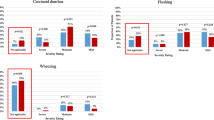Abstract
Introduction
Neuroendocrine tumors (NETs) are malignant solid tumors arising in hormone-secreting tissue. They have historically been very difficult to treat, and advanced NETs are considered incurable. Surgery is the only potentially curative treatment option, though research is ongoing, investigating the efficacy of targeted therapies combined with more traditional chemotherapies. Frequent bowel movements and episodes of flushing are the most common symptoms.
Methods
The present study reports data from an anonymous patient survey of 663 eligible NET patients, identified with the assistance of patient advocacy groups. This study investigated the impact of treatment (surgery alone; surgery plus somatostatin analogue; other treatments) on quality of life (QOL). Finally, we investigate whether recurrent disease results in poorer QOL compared to disease treated curatively with surgery and remaining in remission.
Results and discussion
Results suggest that increased frequency of bowel movements and presence of any flushing symptoms are correlated with decreased quality of life. Treatment groups differed on most Patient Reported Outcomes Measurement Information System (PROMIS) global health and PROMIS-29 scores, including physical function, fatigue, pain, social function, and general physical and mental health, with the surgery group reporting significantly better scores than the other groups (effect size of differences ranged from 0.28 to 0.54). This may be possibly due to effective symptom control reached for these patients through surgery alone. After adjustment for carcinoid syndrome, the association with the treatment group disappeared for all domains except physical functioning. In terms of disease status, patients with recurrent disease reported poorer physical, social, and mental functions. Depression scores were similar between groups; however, patients with recurrent disease reported significantly higher anxiety compared to those with no current NET. Physical functioning was even more markedly different between groups, with recurrent NET patients reporting significantly impaired overall physical function, impaired sleep, and significant fatigue compared to those with no current NET. To our knowledge, this is the first study to comprehensively examine the effect of treatment group, disease status, and symptom burden on the quality of life in NET patients in a large sample. Limitations and future research directions are discussed.
Similar content being viewed by others
References
Yao JC, Hassan M, Phan A, Dagohoy C, Leary C, Mares JE, Abdalla EK, Fleming JB, Vauthey J-N, Rashid A, Evans DB (2008) One hundred years after “carcinoid”: epidemiology of and prognostic factors for neuroendocrine tumors in 35,825 cases in the United States. J Clin Oncol 26(18):3063–3072
Rossi RE, Massironi S, Conte D, Peracchi M (2014) Therapy for metastatic pancreatic neuroendocrine tumors. Ann Transl Med 2(1):8
Jones NB, Shah MH, Bloomston M (2012) Liver-directed therapies in patients with advanced neuroendocrine tumors. J Natl Compr Cancer Netw 10:765–774
Sharma J, Duque M, Saif MW (2013) Emerging therapies and latest development in the treatment of unresectable pancreatic neuroendocrine tumors: an update for clinicians. Therapeutic Advances in Gastroenterology. 6(6):474–490
Mitry E, Walter T, Baudin E, Kurtz JE, Ruszniewski P, Dominguez-Tinajero S, Bengrine-Lefevre L, Cadiot G, Dromain C, Farace F, Rougier P, Ducreux M (2014) Bevacizumab plus capecitabine in patients with progressive advanced well-differentiated neuroendocrine tumors of the gastrointestinal (GI-NETS) tract (BETTER trial): a phase II non-randomised trial. Eur J Cancer 50(18):3107–3115
Beaumont JL, Cella D, Phan AT, Choi S, Liu Z, Yao JC (2012) Comparison of health-related quality of life in patients with neuroendocrine tumors with quality of life in the general US population. Pancreas 41(3):461–466
Cella DF, Tulsky DS, Gray G, Sarafian B, Lin E, Bonomi A, et al. (1993) The Functional Assessment of Cancer Therapy Scale: development and validation of the general measure. J Clin Oncol 11(3):570–579
Frojd C, Larsson G, Lampic C, von Essen L (2007) Health related quality of life and psychosocial function among patients with carcinoid tumours: a longitudinal prospective and comparative study. Health Qual Life Outcomes 5:18
Hays RD, Bjorner J, Revicki RA, Spritzer KL, Cella D (2009) Development of physical and mental health summary scores from the Patient Reported Outcomes Measurement Information System (PROMIS) global items. Quality of Life Research. 18(7):873–880
Davies AH, Larsson G (2006) Ardill J et al Development of a disease-specific quality of life questionnaire module for patients with gastrointestinal neuroendocrine tumours. Eur J Cancer 42(4):477–484
Vinik E, Carlton CA (2009) Silva MP et al Development of the Norfolk quality of life tool for assessing patients with neuroendocrine tumors. Pancreas 38(3):e87–e95
Acknowledgments
The Carcinoid Cancer Awareness Network, Carcinoid Cancer Foundation, Inc., Caring for Carcinoid Foundation, and North American Neuroendocrine Tumor Society assisted in the distribution of survey invitations.
Author information
Authors and Affiliations
Corresponding author
Ethics declarations
Conflict of interest
There are no financial disclosures to report for this manuscript. The authors have full control of all primary data and agree to allow the journal to review the data if requested.
Rights and permissions
About this article
Cite this article
Pearman, T.P., Beaumont, J.L., Cella, D. et al. Health-related quality of life in patients with neuroendocrine tumors: an investigation of treatment type, disease status, and symptom burden. Support Care Cancer 24, 3695–3703 (2016). https://doi.org/10.1007/s00520-016-3189-z
Received:
Accepted:
Published:
Issue Date:
DOI: https://doi.org/10.1007/s00520-016-3189-z




